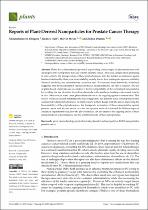| dc.contributor.author | Elbagory, Abdulrahman M. | |
| dc.contributor.author | Meyer, Mervin | |
| dc.contributor.author | Hull, Rodney | |
| dc.contributor.author | Dlamini, Zodwa | |
| dc.date.accessioned | 2023-06-01T13:49:59Z | |
| dc.date.available | 2023-06-01T13:49:59Z | |
| dc.date.issued | 2023 | |
| dc.identifier.citation | Elbagory, A.M., Hull, R., Meyer, M. and Dlamini, Z., 2023. Reports of Plant-Derived Nanoparticles for Prostate Cancer Therapy. Plants, 12(9), p.1870. | en_US |
| dc.identifier.uri | https://doi.org/10.3390/plants12091870 | |
| dc.identifier.uri | http://hdl.handle.net/10566/8989 | |
| dc.description.abstract | Background: Plants have demonstrated potential in providing various types of phytomedicines with chemopreventive properties that can combat prostate cancer. However, despite their promising in vitro activity, the incorporation of these phytochemicals into the market as anticancer agents has been hindered by their poor bioavailability, mainly due to their inadequate aqueous solubility, chemical instability, and unsatisfactory circulation time. To overcome these drawbacks, it has been suggested that the incorporation of phytochemicals as nanoparticles can offer a solution. The use of plant-based chemicals can also improve the biocompatibility of the formulated nanoparticles by avoiding the use of certain hazardous chemicals in the synthesis, leading to decreased toxicity in vivo. Moreover, in some cases, phytochemicals can act as targeting agents to tumour sites. | en_US |
| dc.language.iso | en | en_US |
| dc.publisher | Plants | en_US |
| dc.subject | EGCG nanoparticles | en_US |
| dc.subject | Green nanotechnology | en_US |
| dc.subject | Phytochemicals | en_US |
| dc.subject | Plant-derived nanoparticles | en_US |
| dc.subject | Prostate cancer | en_US |
| dc.title | Reports of Plant-Derived Nanoparticles for Prostate Cancer Therapy | en_US |
| dc.type | Article | en_US |

